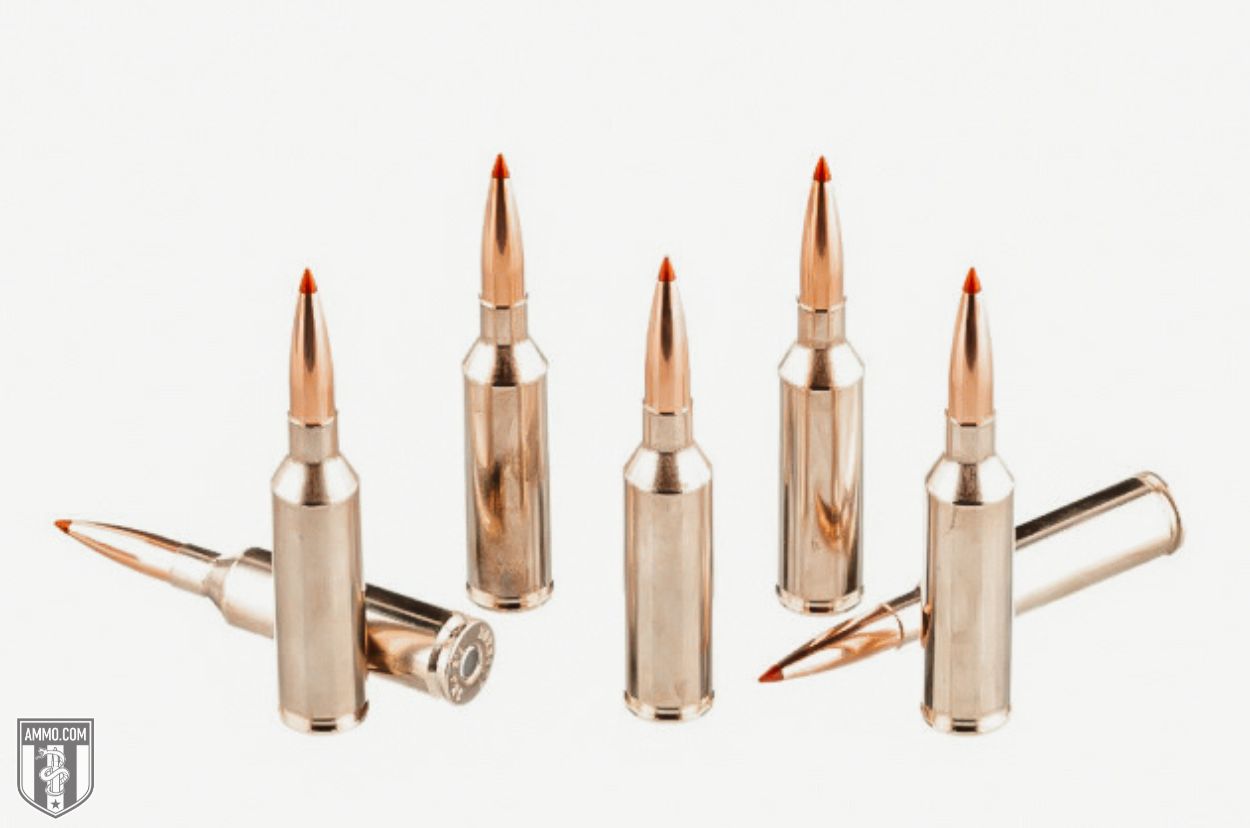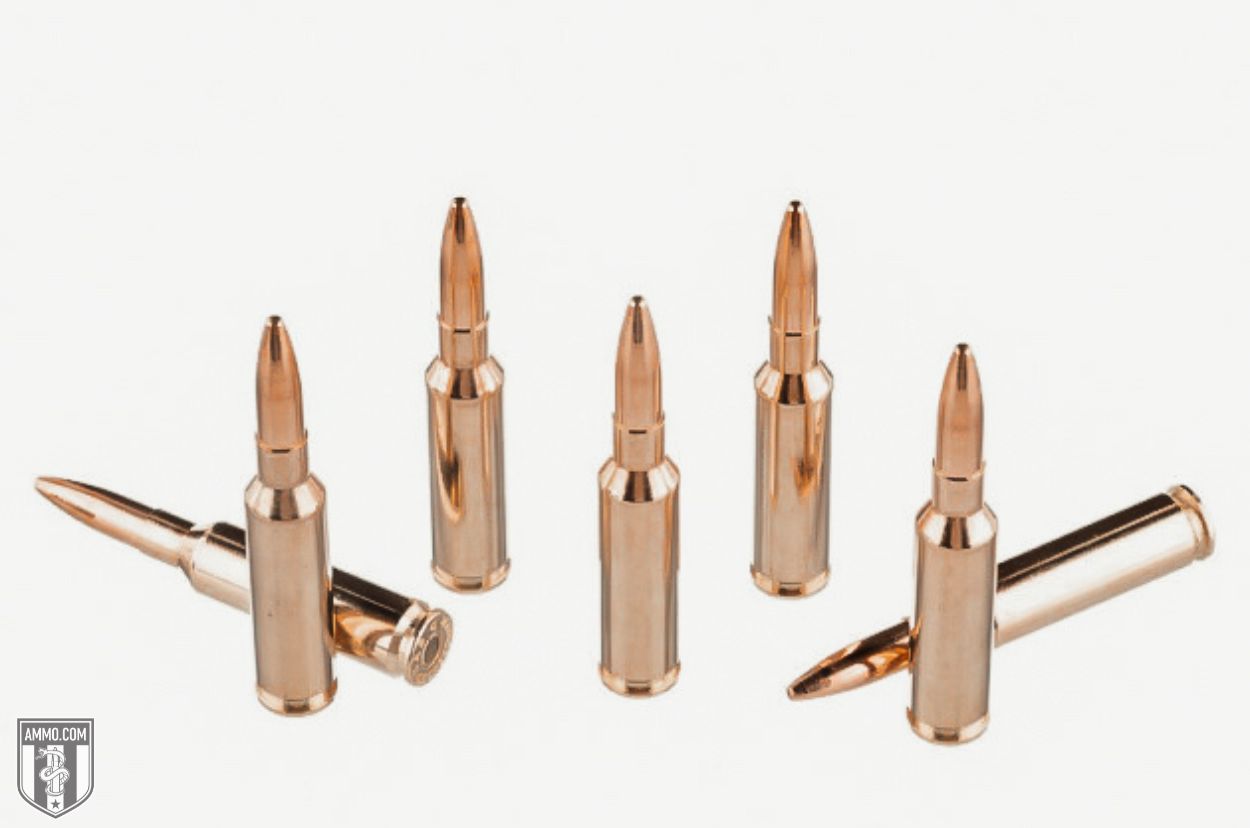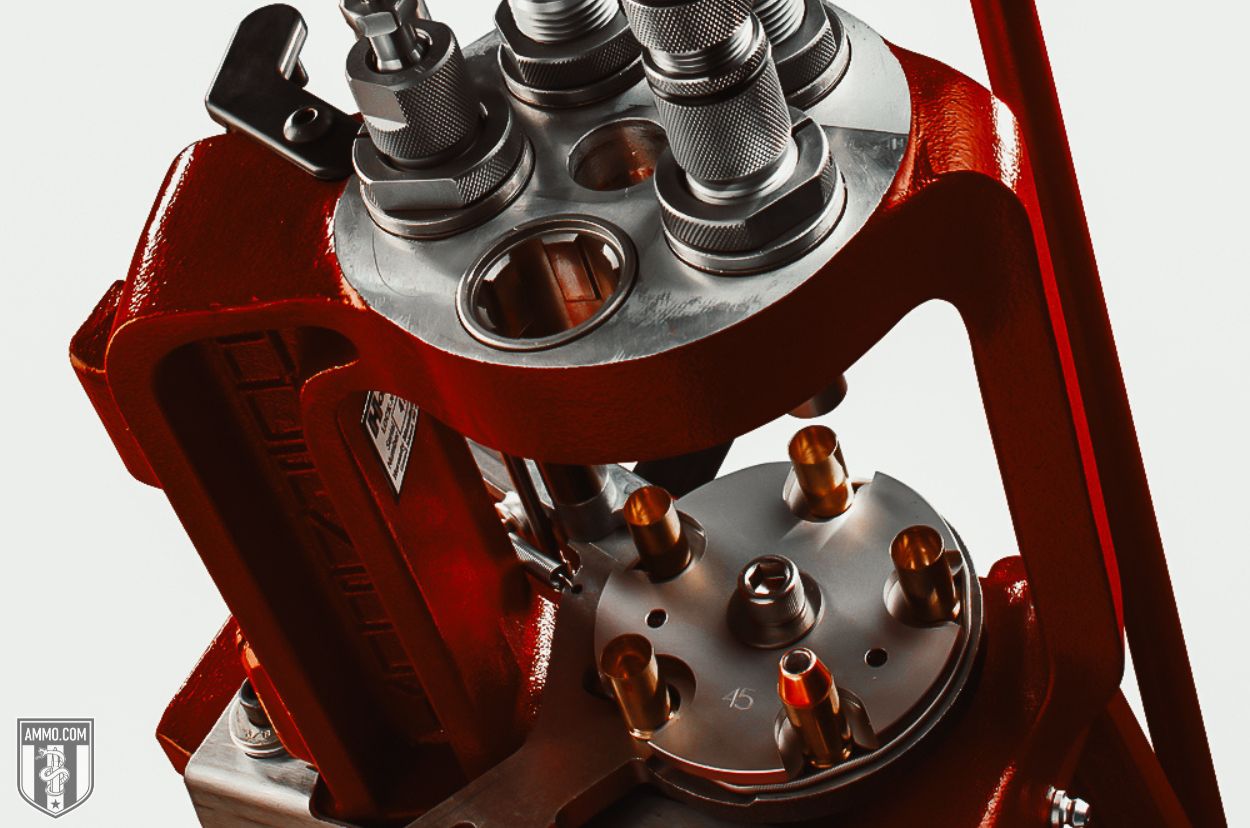6.5 PRC vs. 6.5 Creedmoor: 6.5mm Long Range Battle
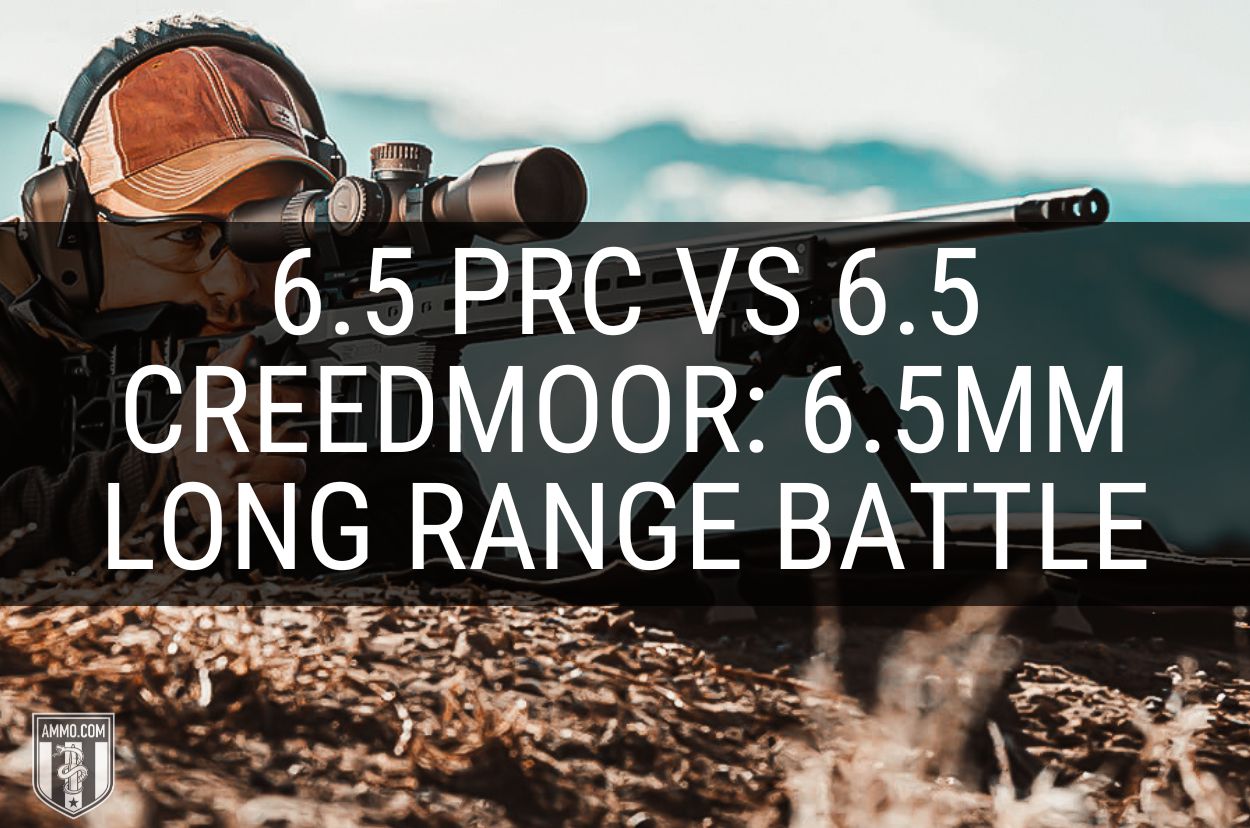
In this 6.5 PRC vs. 6.5 Creedmoor comparison, we pit the two rounds head-to-head in several categories. You'll understand their pros and cons and know which is better suited to your needs.
Keep reading to discover which cartridge dominates distances better. The results ... might just surprise you.
| Category | Winner | Note |
|---|---|---|
| Recoil | 6.5 Creedmoor | The 6.5 Creedmoor has approximately 17 ft-lbs of free recoil vs. 21.6 ft-lbs for the 6.5 PRC. |
| Trajectory | 6.5 PRC | Out to 500 yards, these rounds are virtually identical. Beyond that, the 6.5 PRC has a flatter trajectory. |
| Accuracy | 6.5 PRC | The 6.5 PRC wins a slim margin when firing over distances greater than 500 yards. |
| Ballistic Coefficient | 6.5 PRC | The 6.5 PRC generally has a higher ballistic coefficient than the 6.5 Creedmoor. |
| Stopping Power | 6.5 PRC | The 6.5 PRC wins by a slim margin thanks to its higher velocities (and higher resultant striking energy). |
| Hunting Capabilities | 6.5 PRC | The 6.5 PRC’s longer effective range makes it more versatile. |
| Home Defense | 6.5 Creedmoor | Neither is ideal for defense, but the 6.5 Creedmoor lower recoil and theoretically lower risk of over-penetration give it an edge. |
| Cost/Availability | 6.5 Creedmoor | The 6.5 Creedmoor is much more abundant and available for lower prices. |
| Reloadability | 6.5 Creedmoor | 6.5 Creedmoor components (brass, especially) are easier to source and less expensive. |
6.5 PRC vs. 6.5 Creedmoor Differences & Similarities
We're comparing these rounds in nine separate categories. That way, we'll avoid having a draw (unless there's a draw in an odd number of categories, but what are the odds of that happening?).
In our pursuit of a fair comparison of these rounds, we contacted long-range shooting experts, leaned on our knowledge, researched ballistic data, and went to the shooting range.
Before we start the battle, let's discuss a few similarities and differences between the cartridges.
Cartridge Specs
It wouldn't be difficult to mix these two rounds up at the range. The 6.5 Creedmoor could fit into a 6.5 PRC rifle, though they’re far from interchangeable. Far from it, as chambering the more powerful 6.5 PRC into a 6.5 CM firearm could wind up destroying said firearm (to say nothing of whomever fired it).
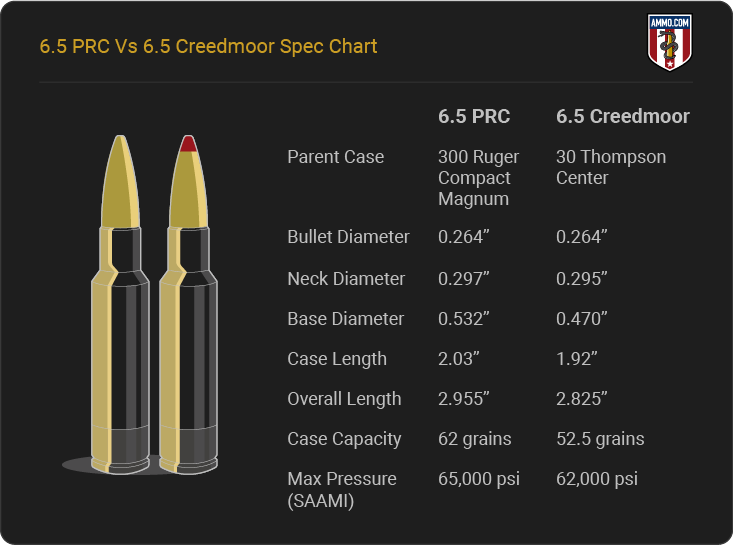
The biggest difference between the two cartridges is that the 6.5 PRC has a larger case, which holds more propellant, increases chamber pressure, and shortens barrel lifespan. The 6.5 PRC is similar to the 6.8 Western, which, uncoincidentally, is another powerful long-range round.
If you’re looking for even higher case capacity, check out the 26 Nosler. Its case is over 50% more capacious than the 6.5 PRC’s.
Since both of these rounds were developed for the same reasons, it's no surprise their specs are similar (not unlike 260 Rem vs. 6.5 Creedmoor).
6.5 Creedmoor vs. 6.5 PRC Recoil
Lots of recoil and long-distance shooting go hand-in-hand, right? Well, that might have been the case pre-6.5 Creedmoor, but it's quickly changing.
Most shooters (myself included) prefer less recoil. It allows us to be more accurate and avoid flinching in anticipation of recoil. Firing is much more comfortable when the first shot doesn't put a big bruise on your shoulder, too.
So, which round has less recoil?
The 6.5 PRC impacts the shoulder with 21.6 ft-lbs of recoil. The 6.5 Creedmoor hits significantly softer, with only 17 ft-lbs of free recoil.
The first time I fired a 6.5 Creedmoor, I was blown away by its light recoil. Granted, 17 ft-lbs is not inconsequential, but other popular hunting rounds put you through way, way worse recoil.
You probably wouldn’t notice much difference while firing these rounds side by side. Even so, the 6.5 Creedmoor takes an early lead.
Trajectory
The bullet's trajectory plays a significant role in long-distance accuracy. I've never met someone who prefers firing a bullet with a steeply arching trajectory over a flatter one.
A flat trajectory allows you to compensate less for bullet drop. More accuracy. Less math. Very nice.
Out to 500 yards, these rounds’ performance is virtually identical, with the 6.5 PRC having a slightly flatter trajectory.
When zeroed at 200 yards, the 6.5 PRC drops 6.1" at 300 yards; 34.6" at 500 yards.
When zeroed at 200 yards, the 6.5 Creedmoor drops 9.6" at 300 yards; 48.9" at 500 yards.
It's when we pass 500 yards that the 6.5 PRC begins to drastically outperform the 6.5 Creedmoor.
If we're looking to name the "Dominator of the Distances," the 6.5 PRC takes it with its flatter trajectory at extended ranges.
Accuracy
Many things factor into the accuracy of a given round, such as the shooter, recoil, trajectory, scope, rifle, and shooting conditions.
There's no arguing that these two rounds are extremely accurate. Both are capable of sub-MOA groups ("minute of angle," where 1 MOA equals 1" at 100 yards). With quality factory ammo, 3/4 MOA and 1/2 MOA groupings are attainable to the average shooter.
However, when all things are as equal as they can be – meaning the same shooter, scope, conditions, and rifle model – the 6.5 PRC edges out the 6.5 Creedmoor because it has a flatter trajectory.
Ballistic Coefficient
The ballistic coefficient (BC) is a numerical expression of a bullet's aerodynamics. Put another way, it's how effectively a bullet cuts through the air and resists wind drift.
Most shooters want high BC bullets that slip through the wind more easily, as they tend to be the most accurate.
Heavy bullets generally have a higher BC because it takes relatively more force (e.g., wind) to disrupt their flight path.
BC also varies depending on bullet design, as well as other factors that are beyond the scope of this article.
6.5mm caliber bullets typically have high BCs. Their long, slender profiles are highly aerodynamic and ideally suited toward resisting wind deflection.
Stopping Power
Stopping power doesn't matter to long-distance shooters. As a hunter, I think it's an overrated concept, largely because aim will ultimately determine whether a trigger pull results in a miss or a well-deserved venison dinner.
But I understand that not all shots are well-placed, which is why stopping power merits consideration.
Stopping power boils down to several factors, including striking energy and terminal expansion. There is no formula to calculate how "deadly" a bullet can be, although sectional density (SD) does contribute a great deal to a bullet's lethality. It's a measure of how deeply a bullet can penetrate body mass based on two variables: mass and diameter.
Because the 6.5 PRC and 6.5 Creed fire similar bullets, they also have very similar SD values: 0.25 to 0.30, depending on the exact bullet weight.
Since the 6.5 PRC pushes its projectile to a higher velocity the 6.5 CM, I would argue that it also has more stopping power – especially when long-range hunting.
The 6.5 PRC wins yet another category.
Hunting
If you've read the other categories, then it's obvious that the 6.5 PRC is the better big-game-hunting cartridge.
While the 6.5 Creedmoor makes a solid whitetail deer hunting round in states like Texas (within 500 yards), the 6.5 PRC is capable of ethically harvesting mule deer and elk over much longer ranges (up to 800 yards) due to its higher stopping power and flatter trajectory.
The 6.5 PRC wins another section and looks to be dominating this comparison.
Home Defense
These rounds are both terrible selections for home defense. They are better than a knife, of course, and a well-placed shot with either would neutralize the threat (to say the least). But they are just too much: certain to pass clean through the threat and jeopardize bystanders, with accompanying recoil, muzzle flash, and report that will rock you, blind you, and deafen you, respectively.
Technically speaking, the 6.5 Creedmoor is less likely to over-penetrate. I'd prefer it over the 6.5 PRC for that reason alone and declare it the winner of this admittedly pointless section. Recommending either of these rounds for home defense is like suggesting a jumbo jet for trips to the local park.
Ammo and Rifle Cost/Availability
The biggest drawback of the 6.5 PRC is the availability and price of ammo and rifles.
6.5 PRC ammo is difficult to find – and when you do find it, be prepared to fork over your paycheck. It'll likely cost you more than $2 per trigger squeeze.
As far as 6.5 PRC rifles go, they're not ridiculously priced. You can find Savage 110 Apex Hunter, Ruger American, and Weatherby Vanguard bolt-action rifles for well under $1,000. If you'd like to step up to a Tikka T3X Lite or Christensen Arms Ridgeline, you can expect to spend $1,500 to $2,500.
6.5 Creedmoor ammo is much easier to find and less expensive, though some of it, like Hornady Precision Hunter 143 grain ELD-X, costs nearly $2 per round as of writing.
The prices of 6.5 CM rifles are nearly the same as prices of analogous 6.5 PRC rifles. You can spend as little as $600 on a Remington 700, or as much as you want on a custom 6.5 Creedmoor rifle.
The 6.5 Creedmoor wins this section thanks to its abundance of ammo and lower prices.
Reloading
Handloading is a great way to save money on ammo and still shoot high-quality rounds.
Both rounds are reloadable, although 6.5 Creedmoor brass is easier to find and less expensive.
Once again, the 6.5 Creedmoor wins a category by a small margin (and some might say a technicality).
Ballistics
The team at Ammo.com has gathered the ballistics for 6.5 Creedmoor and 6.5 PRC factory loads so you can quickly compare each long-distance cartridge.
6.5 Creedmoor Ballistics Chart
| Velocity | Energy (ft-lbs) | Trajectory (in.) | ||||||||||||||||||
|---|---|---|---|---|---|---|---|---|---|---|---|---|---|---|---|---|---|---|---|---|
| Bullet | Length (in) | G1 BC | 0yds | 100yds | 200yds | 300yds | 400yds | 500yds | 0yds | 100yds. | 200yds | 300yds | 400yds | 500yds | 0yds | 100yds. | 200yds | 300yds | 400yds | 500yds |
| 90gr TNT | 24 | 0.240 | 3000 | 2613 | 2257 | 1931 | 1636 | 1382 | 1799 | 1365 | 1019 | 745 | 535 | 382 | -1.5 | 1.5 | 0.0 | -8.7 | -26.8 | -58.1 |
| 100gr ELD-VT | 24 | 0.448 | 3200 | 2978 | 2768 | 2567 | 2375 | 2192 | 2274 | 1970 | 1702 | 1464 | 1253 | 1067 | -1.5 | 1.2 | 0.0 | -5.8 | -16.8 | -34.0 |
| 120gr CX | 24 | 0.428 | 2925 | 2707 | 2500 | 2303 | 2114 | 1934 | 2280 | 1954 | 1666 | 1413 | 1191 | 997 | -1.5 | 1.6 | 0.0 | -7.2 | 24.0 | -42.6 |
| 130gr TGK | 24 | 0.510 | 2950 | 2766 | 2589 | 2419 | 2256 | 2098 | 2512 | 2208 | 1935 | 1690 | 1469 | 1271 | -1.5 | 1.5 | 0.0 | -6.7 | -19.4 | -38.9 |
| 140gr FMJBT | 21.75 | 0.491 | 2658 | 2479 | 2307 | 2141 | 1983 | 1832 | 2197 | 1910 | 1654 | 1425 | 1222 | 1043 | -1.5 | 2.1 | 0.0 | -8.6 | -24.9 | -50.0 |
| 156gr SP | 24 | 0.348 | 2559 | 2313 | 2082 | 1864 | 1662 | 1480 | 2269 | 1854 | 1501 | 1204 | 957 | 758 | -1.5 | 2.5 | 0.0 | -10.6 | -31.2 | -64.5 |
Note: This information comes from ammo manufacturers. Actual ballistics obtained with your firearm can vary considerably from the advertised ballistics. Also, ballistics can vary from lot to lot with the same brand and type load.
6.5 PRC Ballistics Chart
| Velocity | Energy (ft-lbs) | Trajectory (in.) | ||||||||||||||||||
|---|---|---|---|---|---|---|---|---|---|---|---|---|---|---|---|---|---|---|---|---|
| Bullet | Length (in) | G1 BC | 0yds | 100yds | 200yds | 300yds | 400yds | 500yds | 0yds | 100yds. | 200yds | 300yds | 400yds | 500yds | 0yds | 100yds. | 200yds | 300yds | 400yds | 500yds |
| 120gr Trophy Copper | 24 | 0.497 | 3050 | 2857 | 2672 | 2494 | 2324 | 2160 | 2479 | 2175 | 1902 | 1658 | 1439 | 1243 | -1.5 | 1.4 | 0.0 | -6.3 | -18.1 | -36.5 |
| 130gr CX | 24 | 0.489 | 2975 | 2782 | 2597 | 2420 | 2249 | 2086 | 2555 | 2234 | 1947 | 1690 | 1461 | 1256 | -1.5 | 1.5 | 0.0 | -6.6 | -19.3 | -38.8 |
| 140gr SMK | 24 | 0.588 | 3030 | 2867 | 2710 | 2558 | 2411 | 2269 | 2854 | 2555 | 2283 | 2034 | 1808 | 1601 | -1.5 | 1.4 | 0.0 | -6.1 | -17.5 | -35.0 |
| 145gr OTM BT | 24 | 0.703 | 2960 | 2825 | 2695 | 2568 | 2445 | 2325 | 2821 | 2570 | 2338 | 2123 | 1924 | 1740 | -1.5 | 1.4 | 0.0 | -6.2 | -17.7 | -35.0 |
| 156gr Elite Hunter | 24 | 0.679 | 2850 | 2714 | 2582 | 2454 | 2330 | 2209 | 2814 | 2552 | 2310 | 2087 | 1880 | 1690 | -1.5 | 1.6 | 0.0 | -6.8 | -19.4 | -38.4 |
Note: This information comes from ammo manufacturers. Actual ballistics obtained with your firearm can vary considerably from the advertised ballistics. Also, ballistics can vary from lot to lot with the same brand and type load.
Parting Shots: 6.5 PRC vs. 6.5 Creedmoor
With the 6.5 PRC winning 5/9 categories, you might think it's the winner. In most instances, it would be.
However, unless you're consistently firing across distances greater than 500 yards, the 6.5 Creedmoor will be your better bet based on ammo availability alone.
What good is a long-distance rifle if you don't have any ammo for it?
While the 6.5 Creedmoor only won 4/9 sections, I believe it won the more important sections. For that reason, I declare it the winner of the 6.5 PRC vs 6.5 Creedmoor battle.
If you're upset with my decision, reach out to the ammo manufacturers and let them know they need to crank out more 6.5 PRC ammo. Until I see more for a reasonable price, I'll stand by my decision.
Whether you agree with me or not, you can stock up on 6.5 PRC ammo or 6.5 Creedmoor ammo at Ammo.com!
Ammo Comparisons
- .308 vs 5.56
- 6.5 Creedmoor vs .308
- .300 Blackout vs .308
- .300 Win Mag vs .308
- .243 vs .308
- .308 vs .30-06
- 7mm-08 vs .308
- .270 vs .308
- 7.62x39 vs .308
- .223 vs .308
- .338 Lapua vs .308
- .380 ACP vs 9mm
- .223 vs 5.56
- .300 Blackout vs 5.56
- 9mm vs 45 ACP
- 9mm vs 40 S&W
- .357 SIG vs 9mm
- 10mm vs 9mm
- 9mm vs 9mm Luger
- .243 vs .270
- .300 Win Mag vs .30-06
- .270 vs .30-06
- .40 vs .45
- 38 Special vs 357
- 9mm vs 40 vs 45
- 5.56 vs 7.62x39
- 338 Lapua vs .30-06
- .30-30 vs .30-06
- 300 PRC vs 338 Lapua
- .30-06 vs 7mm
- 300 Win Mag vs 338 Lapua
- 300 PRC vs 300 Win Mag
- 300 WSM vs 300 Win Mag
- 338 Win Mag vs 338 Lapua
- 12 Gauge vs 20 Gauge
- 10mm vs 357 Mag
- .30-30 vs 7.62x39
- 224 Valkyrie vs 22-250
- 17 HMR vs 22 Mag
- 7.62x39 vs .300 Blackout
- 45 ACP vs 45 Auto
- 45-70 vs 30-30
- 300 Blackout vs 223
- 357 Magnum vs 9mm
- 350 Legend vs 300 Blackout
- 224 Valkyrie vs 223
- 45 ACP vs 38 Super
- 6.5 Grendel vs .308
- 17 HMR vs 22 LR
- 10 Gauge vs 12 Gauge
- 22-250 vs 223
- 45 Colt vs 45 ACP
- 350 Legend vs 30-30
- 5.7x28 vs 223
- 5.7 vs 9mm
- 5.56 vs 5.7
- 22 vs 9mm
- Buckshot vs Birdshot
- 450 Bushmaster vs 308
- 450 Bushmaster vs 223
- Buckshot vs Slug
- 6.5 Grendel vs 5.56 vs 223
- 6mm ARC vs 6.5 Grendel
- 44 vs 45
- 458 SOCOM vs 5.56
- 357 vs 44
- 32 ACP vs 380
- 300 Win Mag vs 338 Win Mag vs 338 Lapua Mag
- 450 Bushmaster vs 458 SOCOM vs 50 Beowulf
- 6mm Creedmoor vs 6.5 Creedmoor
- TMJ vs FMJ
- 44 Special Vs 44 Magnum
- 45 90 vs 45 70
- 6.8 Western vs 6.8 SPC
- 50 Beowulf vs 50 BMG
- 26 Nosler vs 6.5 PRC
- 28 Gauge vs 410
- 6.8 SPC vs 5.56
- 6.8 SPC vs 6.5 Grendel
- 6.8 Western vs 7mm Rem Mag vs .28 Nosler
- 6.8 Western vs 6.5 Creedmoor
- 22 Hornet vs 223
- 6.8 Western vs 6.5 PRC
- .410 vs 12 Gauge
- .410 vs 20 Gauge
- 22 LR vs 22 Mag
- 6mm ARC vs 243
- 7mm-08 vs 270
- 243 vs 6.5 Creedmoor
- Nickel vs Brass Casing
- 204 Ruger vs 223
- 50 Beowulf vs 5.56
- 260 Remington vs 6.5 Creedmoor
- 6mm Remington vs 243
- 28 Nosler vs 300 PRC
- 50 Beowulf vs 50 AE
- 22 Nosler vs 22-250
- 450 Marlin vs 45-70
- 300 Win Mag vs 300 Norma
- 458 SOCOM vs 300 Blackout
- 38-55 vs 45-70
- 22 Hornet vs 22 LR
- 300 Norma vs 338 Lapua
- 338 Lapua vs 50 BMG
- 28 Nosler vs 300 Win Mag
- 28 Nosler vs 6.5 Creedmoor
- 204 vs 22-250
- 458 SOCOM vs 45 70
- 44 40 vs 45 70
- 6.8 SPC vs 6.5 Creedmoor
- 450 Bushmaster vs 30-06
- 7mm Rem Mag vs 300 Win Mag
- 30 Carbine vs 223
- 25-06 vs 30-06
- 26 Nosler vs 28 Nosler
- 16ga vs 12ga
- 30 06 vs 7.62 x54R
- 9mm Makarov vs 9mm Luger
- 350 Legend vs 223
- 30 Carbine vs 5.56
- 6.5x55 vs 6.5 Creedmoor
- 6.5 Creedmoor vs 270 vs 25-06
- M193 vs M855
- 450 Bushmaster vs 458 SOCOM
- 6.5 Grendel vs 6.5 Creedmoor
- 350 Legend vs 5.56
- .277 Fury vs 6.8 SPC
- 277 Fury vs 300 Win Mag
- 10mm vs .45 ACP
- 277 Fury vs 223
- 6.8 SPC vs 300 Blackout
- 6.5 PRC vs 6.5 Creedmoor
- 277 Fury vs 308
- 277 Fury vs 6.5 Creedmoor
- 350 Legend vs 450 Bushmaster
- 277 Fury Vs 5.56 NATO
- 10mm vs 40S&W
- 32 ACP vs 9mm
- 32 Special vs 9mm
- 8.6 Blackout vs 300 Blackout
- 30 Super Carry vs. 9mm
- 5.56 vs 9mm
- .50 Action Express vs 9mm
- 7.62x25 vs. 9mm
- 10mm vs 44 Magnum
- 300 Blackout vs 300 Win Mag
- 6.5 Grendel vs 300 Blackout
- 460 Rowland vs 10mm
- 300 RUM vs 300 PRC
- 300 Norma vs 300 PRC
- 45 GAP vs 45 ACP
- 7mm PRC vs 300 Win Mag
- 300 PRC vs 6.5 Creedmoor
- 300 PRC vs 308
- 357 SIG vs 357 Mag
- 7.62x39 vs 7.62x51
- 243 Win vs 223 Rem
- 30 Nosler vs 300 PRC
- 6.5 Creedmoor vs. 30-06 Springfield
- 450 S&W vs. 44 Magnum
- 6.5 Creedmoor vs. 300 Win Mag
- 454 Cassull vs. 45-70 Govt
- 454 Cassull vs. 44 Mag
- 7.62x54r vs. 308 Winchester
- 22 ARC vs. 223 Rem
- Subsonic vs. Supersonic Ammo
